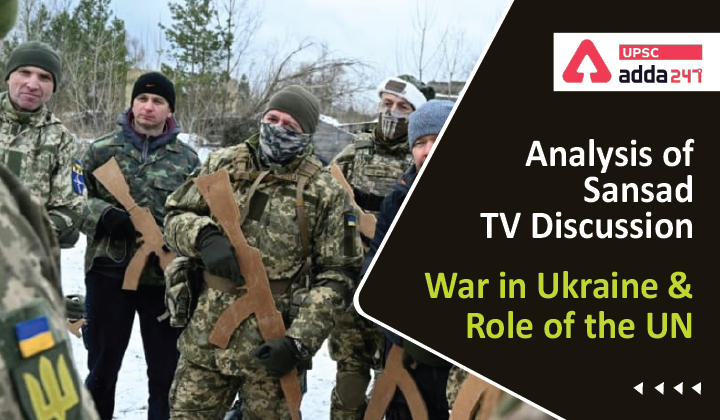Table of Contents
Analysis Of Sansad TV Discussion: ”War in Ukraine and Role of the UN”
Relevance
”GS 2: Important International Institutions”
Introduction
- Russian military operations inside the sovereign territory of Ukraine on a scale that Europe has not seen in decades, conflict directly with the United Nations Charter.
- Despite a sustained UN-led and international diplomatic push to avert military action in Ukraine, Russia’s President Vladimir Putin did just that.
- So, Strengthening the United Nations is critical. The Member States, Observers, and all stakeholders must collaborate, to revitalize this organization.
Why the relevance of the UN is under serious question?
- The council’s structure has largely remained constant since its establishment in 1946, sparking debate among members about the need for revision.
- In recent years, the council’s capacity to respond to significant conflicts and crises often stymied by members’ competing interests, such as Syria’s civil war and the most recent — the Russia-Ukraine issue, has been questioned widely.
- Tensions have risen between Russia and France, the United Kingdom, and the United States since Russia’s intervention in Ukraine in 2014, raising concerns that the body is less capable of defusing crises. Given that Russia has used its veto power nearly twenty times to reject resolutions aimed at holding the Assad administration accountable for atrocities documented by UN sources.
Role of the UN security council in crisis management
- The Security Council, the UN’s main crisis-management body, has the authority to impose binding peacekeeping commitments on the 193 UN member nations.
- The UN Security Council aims to peacefully resolve international conflicts in accordance with Chapter VI of the UN Charter (the foundation text of the organisation, describing the goals and values that were agreed upon in 1945), which allows the council to request that parties seek resolution through discussion, arbitration, or other peaceful measures.
- If that fails, Chapter VII of the UN Charter gives the Security Council the authority to adopt more proactive measures, such as imposing sanctions or approving the use of force “to maintain or restore international peace and security.”
UN in the appealing and condemning mode
- The UN General Secretary appealed to Russia that ”The use of explosive weapons in populated areas should – at all costs – be avoided.’’
- It called for the full respect of international humanitarian law, in particular the four Geneva Conventions of 1949 and their first additional protocol of 1977, as well as international human rights law.
How ‘Veto Power’ is the biggest hurdle in stopping the current Russia-Ukraine Conflict?
- Many urged the Security Council to demand that Russia halt all military action, condemn the aggression against a sovereign state, and defend Ukraine’s territorial integrity, as well as to remind Russia of its obligations under the UN’s Charter.
- But this is essentially impossible, given Russia’s veto authority over council decisions.
- The UN Security Council now finds itself in a difficult situation — The United Nations Security Council is presently in a tricky position: it was established after WWII to prevent another conflict, including permanent members with ‘veto power’ that is provoking a new crisis in Ukraine.
- The UN Security Council’s five permanent members, chosen after World War II, have veto power. The drafters agreed that the proposed resolution or decision would not be approved if any of the permanent members voted against it.
- If a permanent member does not agree with a proposed resolution but does not want to cast a veto, it can choose to abstain, allowing the resolution to pass if it receives the needed nine positive votes.
- After Russia’s takeover of Crimea in 2014, a similar scenario played out. China, which also has a veto, abstained in the Security Council, while 13 other countries voted in favour of the resolution. Russia exercised its right to veto.
Why do ‘veto power,’ need to be removed?
- The right of veto was created by the Charter’s crafters to ensure that the World War II winners spoke with a single voice on matters of war and peace, rather than giving each of them the ability to block any resolution they desired.
- The authors of the Charter expected that the victor nations would, on the whole, be willing to agree on suitable action – but experts indicated shortly after WWII ended that they were not willing to agree at any point.
- The right of veto thus had a very detrimental role during the East-West conflict, and the criticism of this Charter clause – which has remained to this day – was perfectly justified.
- Permanent members now threaten to use their veto, more or less quietly, to guarantee that Security Council resolutions are framed in accordance with their preferences or to prevent them from being put to a vote at all.
Conclusion
- Peace is the most important global public good and the United Nations was created to deliver it but it has totally helpless due to Veto power. The only immediate solution in this conflict is to come together in cooperation and solidarity to support everyone affected and to overcome this situation. In long term, radical reform in the UN is the need of the hour.



 TSPSC Group 1 Question Paper 2024, Downl...
TSPSC Group 1 Question Paper 2024, Downl...
 TSPSC Group 1 Answer key 2024 Out, Downl...
TSPSC Group 1 Answer key 2024 Out, Downl...
 UPSC Prelims 2024 Question Paper, Downlo...
UPSC Prelims 2024 Question Paper, Downlo...




